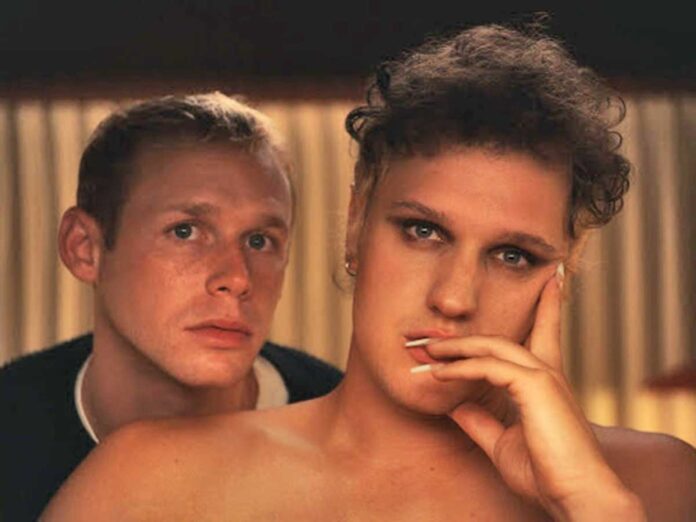“Starf***ers,” a nifty short film premiering at the Sundance Film Festival January 20, is as wily and sly as its protagonists. Written and directed by queer actor Antonio Marziale (who also stars), the story has a Hollywood escort (out gay Philly native Cole Doman) whose meeting with a client (Jonathan Slavin) takes an unexpected turn.
All that should be revealed is that Marziale and Doman, who cowrote the story together, provide viewers with an experience. (The film can be screened online during the Sundance Film festival between January 20 and 31.) The two friends chatted with Philadelphia Gay News about their fabulous new short.
Can you discuss how this short went from idea to execution?
Antonio Marziale: Cole and I are very inspired by how [certain members of the queer community] can use their talent to renegotiate circumstances of lives and create alternate realities. For femme-representing people typically, in a patriarchal lens, it gives full permission to lean into whatever is empowering them, and everyone has their own way of expressing themselves. Individual identities come out. It’s about giving agency to a character who, in certain circumstances, might be overlooked.
Cole Doman: The idea blossomed because Antonio and I believe in each other and wanted to work on something together. We get a lot of projects that make us have to work a different version of ourselves or suppress some of the femme qualities we have innately, and we sat down and thought: What can we make that feels like us, and that if we got this script we’d be excited to work on? When your collaborator is your best friend, nothing is off limits. We listed ideas we had, and it went from there.
Can you talk about your approach to this material? There are tonal shifts, as well as an emphasis on performance.
Marziale: The tone in the film is found in the cinematographer and the location. We wanted to create a thriller-type film. The tarp in one scene is great because it creates something confusing and then we answer the question. If it’s confusing, stick with us. We hold a shot in that scene for an uncomfortable amount of time. You are forced to watch this in a voyeuristic way, which is similar to Jonathan Slavin’s character. When we cut into a scene, you don’t know what’s going on, so you are playing catch up, which is kind of the intention. Audiences want to be flirted with, so they lean in. It was a challenge how to make the first and second halves of the film aesthetically in the same world.
Doman: To the point of performance, thrillers and horror have always had this intense tie to queerness. There’s a huge queer community involved in the horror genre. It was quite literal to be a revenge story that feels really loud and queer and non-violent and a celebration in some way.
Cole, your performance is really brilliant. As we see more of your character, he comes off as charming and sexy one moment, seductive and a fantasy the next, and then sinister and even sassy the moment after that. Can you talk about calibrating the character?
Doman: My character was not from means, and he uses codeswitching to get what he needs and wants. It was good to step into different parts of myself to get there — when to be apologetic, or sweet, or bashful or hold and cool it off. I got to understand Antonio’s [mindset] and that helped plot it out for me.
What can you say about the power dynamics in the film?
Doman: The truth of the scenario reaffirms the power dynamic that anyone in power is giving you this opportunity and you feel helpless to not say yes.
Marziale: There’s a [line] in the film about a black hole, and once you get close enough to a black hole, you can’t escape when you reach the event horizon. It warps space time around it, but it can’t be seen. That is what it feels like to have a lot of clout in Hollywood, those around you get warped by your fame. It’s like being a politician. The warping that comes from that weight is inescapable, and once you get close enough to it, you get swallowed in.
Doman: There’s a power dynamic the film has with the audience, too.
I am curious about the showstopping scene. What made you go in that direction with the story and depict it in the very specific way you did?
Marziale: The element of surprise is a large part of it. It feels very celebratory and authentically queer. In the last monologue, you learn what my character has been through. It’s based on Samuel Beckett’s “Not I” monologue, which is a mouth that is illuminated in darkness, and it starts to put you in a trance. It speaks fast and lulls you into something. For imagery I focused on Dreyer’s “The Passion of Joan of Arc” — big eyes welling up, so we shot it from an angle with a slow push in.
Once you see “Starf***ers,” you want to see it again to pick up all the nuance and re-experience the ride it takes you on. Was that that the intent?
Marziale: At the end of the day, it’s stimulating. The goal is to be stimulated.
Doman: I have watched this with people who were laughing and with people who were uncomfortable. I heard from someone who said they needed to watch it a second time because they needed to get more. That is, ultimately, the goal. You get a different feeling every time things come together, and that’s all we can ask for making a short film.
For tickets and more information, visit https://festival.sundance.org/.

